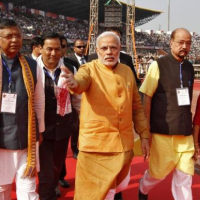Modi to Settle Boundary Issue With Bangladesh
 Prime Minister Narenda Modi at the BJP meeting in Guwahati (photo: Reuters)
Prime Minister Narenda Modi at the BJP meeting in Guwahati (photo: Reuters)
During his first visit to Assam as prime minister, Narendra Modi has announced that India will go ahead with the ratification of the previous administration’s land boundary agreement with Bangladesh. In doing so, he has placed national interest above the regional populism favoured by the state unit of his own party.
The boundary agreement signed in Dhaka by Modi’s predecessor Dr. Manmohan Singh in September 2011 involves a land swap to rationalise the messy boundary that India inherited from Partition.
According to the Indian Express, the sticking point has been tiny enclaves owned by each country left inside the territory of the other at the time of Partition. This led to many people being left stateless and unable to access the benefits of development from either nation. These enclaves have reportedly also become major sources of criminal activity.
According to the 2011 agreement, the two South Asian neighbours would exchange enclaves that fall in each other’s territory: India would ‘cede’ 111 enclaves amounting to about 17,160 acres and ‘gain’ 57 enclaves spread over 7110 acres from Bangladesh.
Since it involves the ‘exchange’ of territories, the agreement required an amendment to the Constitution. The 119th amendment bill was placed in the Rajya Sabha late last year, but was opposed by regional parties Trinamool Congress (West Bengal) and Asom Gana Parishad (Assam). While the BJP did not oppose the tabling of the bill, it signalled ambivalence at the time since its party unit in Assam was opposed to the swap.
Modi perhaps fittingly announced his decision at a BJP meeting in Guwahati on Sunday. "On the issue of land transfer, I know and understand the sentiments of the people of Assam," Modi told BJP workers. "Whatever we do, there might be a perception of a short-term loss, but ultimately Assam will gain in the long run."
The prime minister promised the people of Assam that Delhi would address their concerns on illegal immigration from Bangladesh. He said the land swap would help the state permanently resolve the immigration issue that has dominated its political landscape for decades.
"I will make such an arrangement that all the roads that are today helping Bangladeshis enter and destroy Assam are closed," Modi said. "To ensure this, even a transfer of land will be used."
The government is now expected to seek approval of the two houses for the bill, as it was recently cleared by the standing committee on external affairs.
By ratifying this agreement, India will finally settle its longest land border. Our 4,060 km-long boundary with Bangladesh is longer than those with China and Pakistan.
Having a settled boundary will allow Delhi and Dhaka to manage it effectively – through more intensive cooperation on countering terrorism and extremism, facilitating trade, building trans-border industrial corridors, and preventing the illegal movement of people.
With the territorial question settled, Modi can be expected to unveil a genuine strategic partnership with Bangladesh when he visits Dhaka in the near future.
- Karan Singh
To Learn More:
Dhaka Boundary Settlement: Narendra Modi bites the Bullet (by C Raja Mohan, Indian Express)
Assam groups angry over PM Narendra Modi stand on Bangla land swap (by Samudra Gupta Kashyap, Indian Express)
Modi vows to halt illegal immigrants from Bangladesh (Reuters)
- Top Stories
- Controversies
- Where is the Money Going?
- India and the World
- Appointments and Resignations
- Unusual News
- Latest News
- India College Chain’s Expansion into U.S. Draws Opposition from Massachusetts Officials over Quality of Education
- Milk Shortages in India Tied to Release of New Movies Featuring Nation’s Favorite Stars
- Confusion Swirls around Kashmir Newspaper Ban in Wake of Violent Street Protests
- Polio-Free for 5 Years, India Launches Vaccine Drive after Polio Strain Discovery
- New Aviation Policy Could Increase Service, Lower Ticket Prices





Comments
moreless